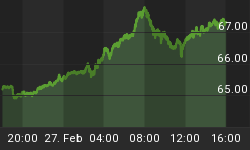Each commodity market has its own story to tell: oil prices are falling because OPEC can't agree production cuts, steel faces a glut from overcapacity, and even the price of maize has fallen, presumably because of good harvests.
In local currencies this is not so much the case. Of course, the difference between prices in local currencies and prices in US dollars is reflected in the weakness of most currencies against the dollar in the foreign exchange markets. This tells us that whatever is happening in each individual commodity and in each individual currency the common factor is the US dollar.
This is obvious perhaps, but the fall in commodity prices and the rise in the US dollar have to be seen in context. We should note that for most of the global population, the concern that we are facing global deflation (by which is commonly meant falling prices) is not yet true. Nor is a conclusion that the fall in the oil price indicates a sudden collapse in demand for energy. When the dollar price of oil began to slide, so did the exchange rates for all the other major currencies, confirming a significant part of oil's price move came from dollar strength, which would have also been true of commodity prices generally.
All we can say is that on average there has been a shift of preferences towards holding dollars and away from holding commodities. Looked at in this light we can see that a trend of destocking can develop solely for financial rather than business reasons, because businesses which account in dollars face financial losses on excess inventory. It is the function of speculators to anticipate these decisions, which is what we have seen in recent months.
Macro-economists, who are Keynesian or monetarist by definition, are beginning to interpret falling commodity prices and a rising dollar as evidence of insufficient aggregate demand, which left unchecked will lead to deflation, increasing unemployment, bankruptcies, falling asset prices, and bank insolvencies. It is, they say, an outcome to be avoided at all costs by ensuring that aggregate demand is stimulated so that none of this happens.
Whether or not they are right in this assessment is not the point. They neglect to allow that some of the move in commodity prices is due to the currency itself as the numéraire of all prices.
For evidence of this we need look no further than the attitude of the Fed and every other central bank that targets price inflation as part of their monetary policy. In forming monetary policy there is no allowance for the possibility, nay likelihood, that in future there will be a change in preferences against the dollar, or any other currency for that matter, and in favour of anything else. The tragedy of this lack of market comprehension is that it's a fair bet that monetary policy will not only succeed in limiting the rise of the dollar as it is designed to do, but end up undermining it when preferences shift the other way.
The moral of the story is that the Fed may be able to fool some of the people all of the time and all of the people some of the time, but worst of all they are fooling themselves. And we should bear in mind that dollar strength is only a trend which can easily reverse at any time.















